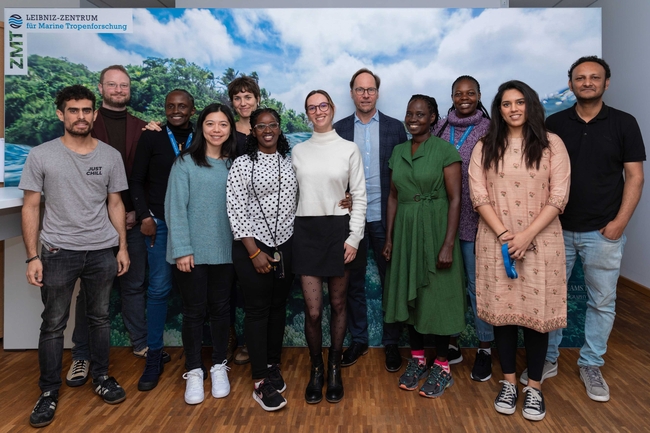After being awarded the prestigious 18th Bremen Solidarity Prize the day before, Ugandan activist Hamira Kobusingye visited the Leibniz Centre for Tropical Marine Research (ZMT). She accepted an invitation from ZMT Director Raimund Bleischwitz, who gave the laudatory speech for the climate activist during the award ceremony at Bremen's City Hall.
In her home country and internationally Hamira Kobusingye campaigns for climate justice, for women's rights and health issues. She demands that the industrialised nations finally take responsibility for their role in causing climate change. She stands for many people in the Global South who are no longer prepared to stand idly by and watch the developments in their countries but are also increasingly networking internationally.
Hamira Kobusingye and her mother Amina spent a morning at ZMT. The 27-year-old found out about the work of the institute and got to know some of the staff during the so-called "Palaver", a weekly meeting of ZMT members to exchange information about current research, publications or expeditions, to introduce new colleagues and guests at the institute or to receive information about events and internals from the various committees.
ZMT-Direktor Raimund Bleischwitz, Hamira Kobusingye und ihre Mutter Amina N. Abiiri | Foto: Matej Meza
ZMT Scientific Director Raimund Bleischwitz, Hamira Kobusingye and her mother Amina N. Abiiri | Photo: Matej Meza
During the palaver, Hamira talked about herself and her work for climate justice and women's rights, told about her early motivation to stand up for women and children with HIV infections and described the path that led her to her national and international commitment to climate protection and climate justice. In doing so, Hamira Kobusingye once again emphasised the importance of holding politics and companies accountable for climate protection and climate justice.
On the occasion of the visit, the representatives of the PhD students at the ZMT – Bhakti Shah, Lol Dahlet and Mondane Fouqueray – had organised a discussion with PhD students and young researchers at the ZMT. The discussion covered topics such as climate finance, climate justice loss and damage, but also concrete challenges for Hamira Kobusingye as an activist and the pros and cons of an academic career.
In the next few days, Hamira Kobusingye will travel to Bremerhaven, Berlin and Brussels to meet with political representatives and NGOs.
About Hamira Kobusingye
The awardee of the 18th Bremen Solidarity Prize, Hamira Kobusingye comes from Kampala, the capital of Uganda. She came into contact with the issues of health and social justice at an early age through her mother's work. Later, she got involved in a project in which women were to create a livelihood for themselves through vegetable production and sales. Extreme weather events and drought regularly jeopardised the success of their work, so that the women involved were unable to improve their financial situation despite great personal commitment.
Hamira Kobusingye deals with climate change in her work. Especially the health and ecological consequences of large-scale contamination in the Niger Delta moved her to protest against oil projects in her own country and the related construction of the East African Crude Oil Pipeline. She tries to give a voice to the people affected by the construction of the pipeline. Inspired by the actions of Vanessa Nakate, winner of the Helmut Schmidt Future Prize 2022, she joined the weekly protests of the "Fridays for Future" movement in Kampala and became a driving force behind the "Rise Up Movement", which connects young African climate and environmental activists.
Hamira Kobusingye is also active at an international level. In 2022, she travelled through Europe with other climate activists from Uganda as part of their so-called "Climate Mobilisation Tour" and, among other things, demanded at the G7 Summit in Bavaria that the industrialised nations take responsibility for their role in causing climate change and that the appropriate funds and support are provided to reduce the effects of climate change in the countries of the Global South and thus create a basis for equitable and sustainable development.























